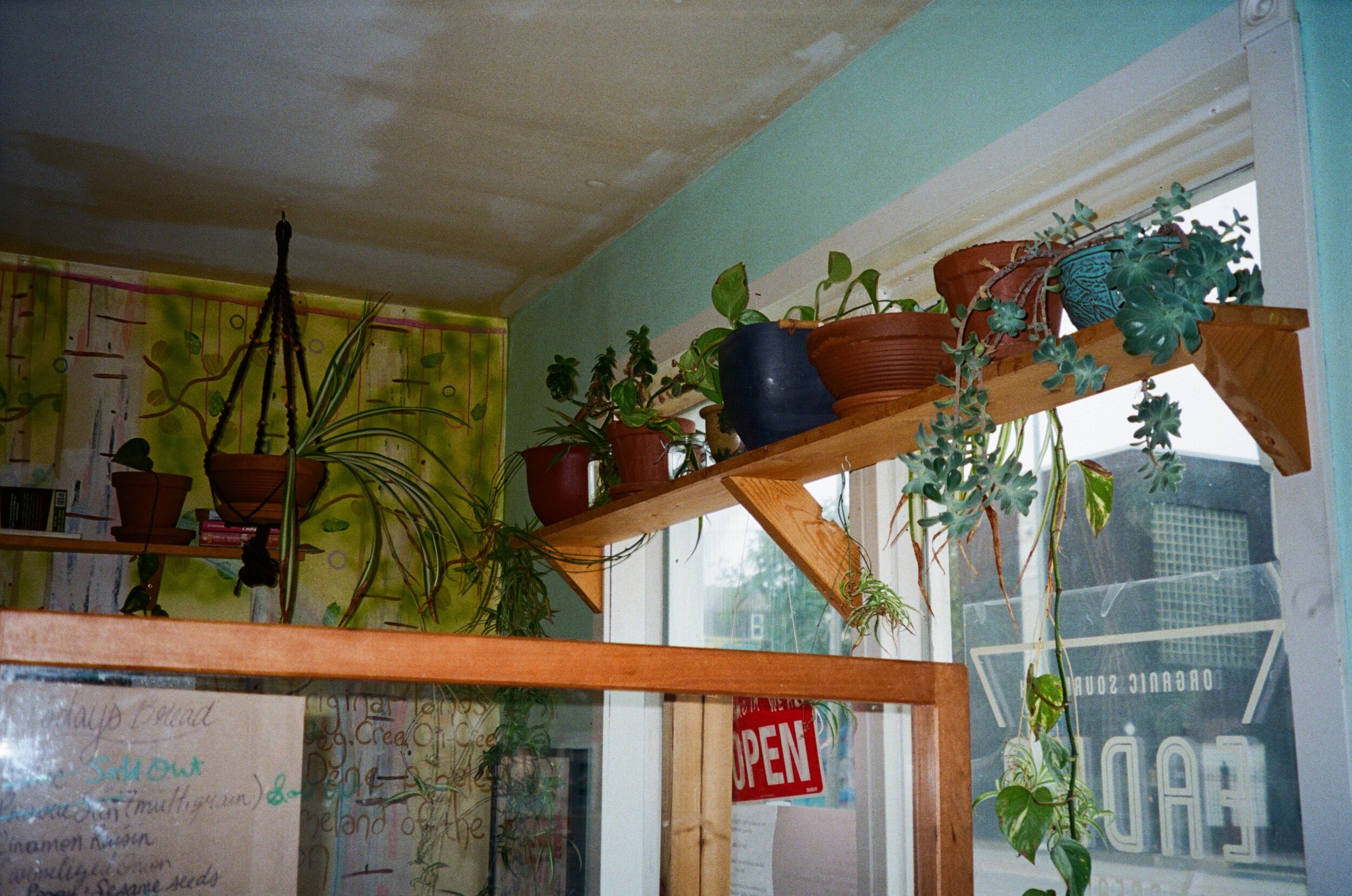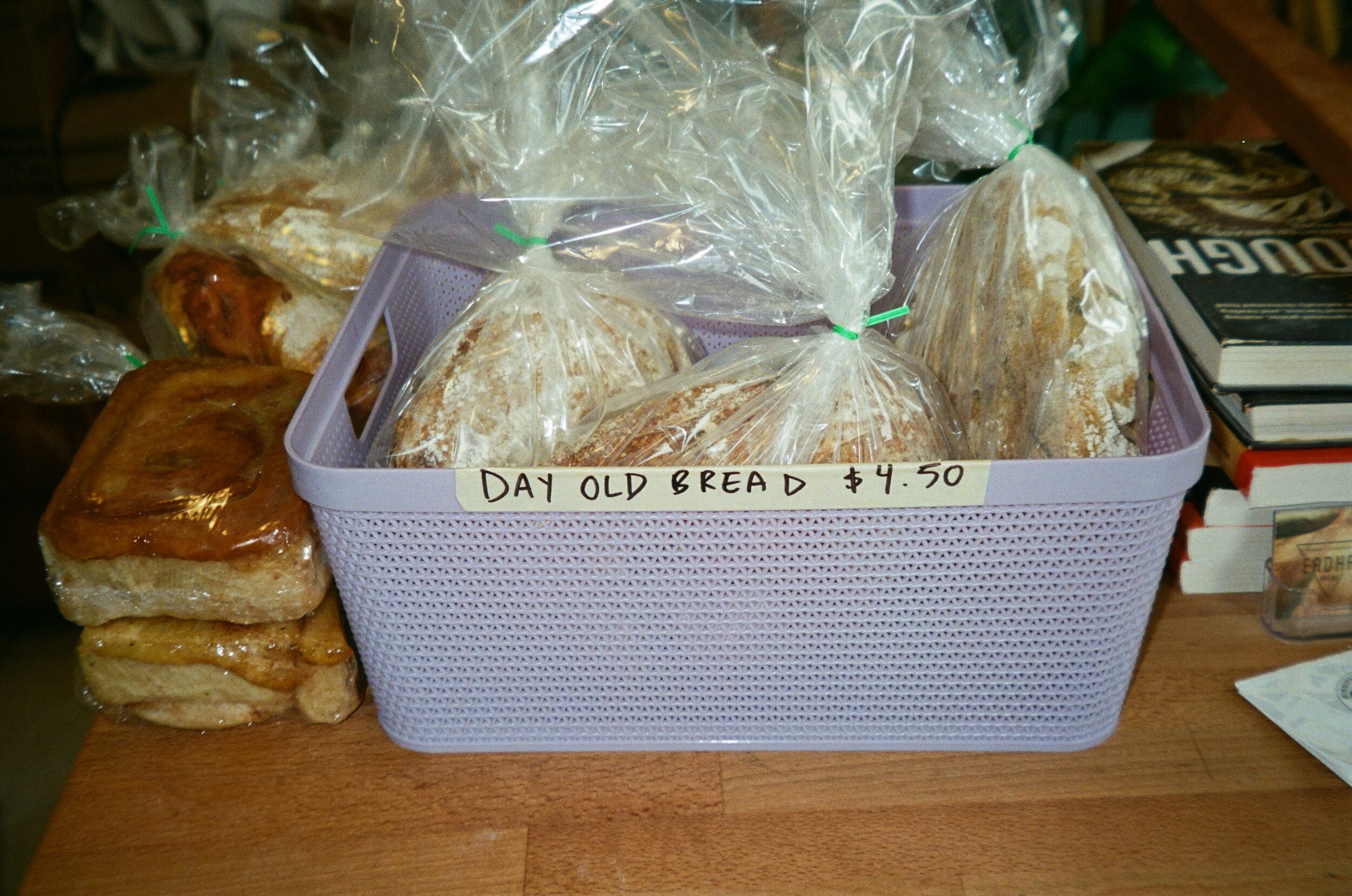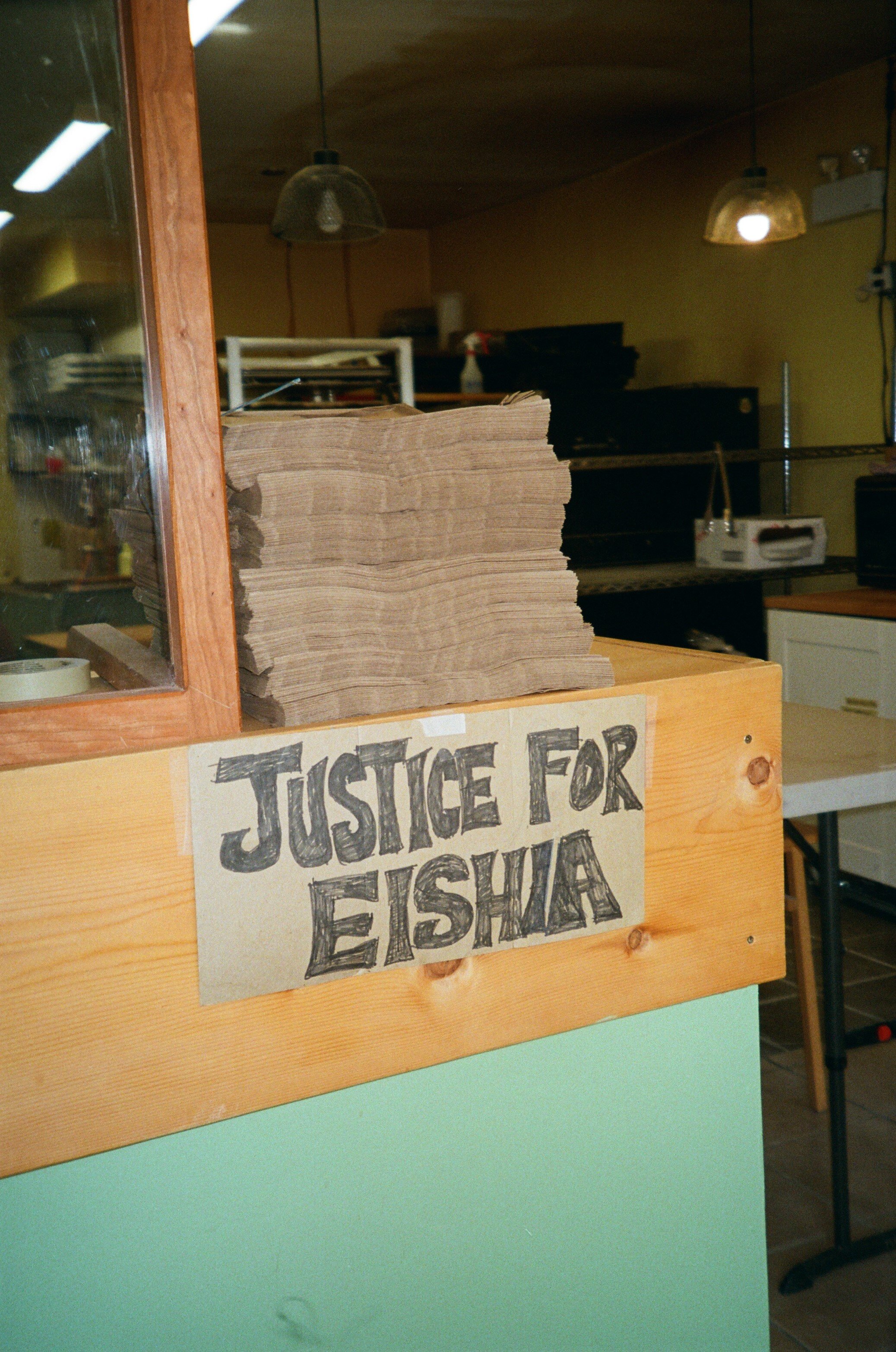cora makes sourdough (every day)
cora makes sourdough (every day)
Where are we?
We’re in the bakery, Eadha Bread, we’re also known as Eadha Bakery or just Eadha.
What prompted you to open this bakery?
I was selling bread at farmers markets and through a bread share, while using shared kitchen space, which was a fairly transient process all in all - I didn’t have a home base. I was more or less doing all of the work, baking, deliveries and management myself so at the end of the second summer of doing markets, and then getting kicked out of the kitchen I was baking in, it was clear I either had to stop doing it or find a permanent location. I live in the neighbourhood and I was baking out of Pizza Boys just down the street. The owner of Pizza Boys also owns this building, this building became available, and then I was like, “okay.” It was then a matter of deciding whether to just continue the operations I had been already been doing, but out of here, or to add a storefront. So here we go. Before COVID there were eight staff and me, and we had been open for two years at the start of lockdown.
“Creating a space and a product that is accessible to the diversity of the people who live in the neighbourhood is one way we can actively be working against gentrifying the neighbourhood. ”
Can you tell us about the name Eadha?
It’s a Celtic name that means ‘endurance.’ Endurance is an obvious necessity for any small business. Owner or small business in general. And then sourdough bread making takes three days in total so it’s not fast and easy, it’s more slow and dirty. More of an endurance sport. Eadha is also connected to the Poplar Tree in some Celtic realm, I think I was reading about trees and the word popped up, I liked the way it sounded. I remember in my first summer doing markets a customer told me - and he’s also a Mennonite by culture - that Mennonites use the same word and it means ‘of the earth.’ So I like that meaning too.
What makes this bakery different from other bakeries?
We ferment everything we sell here. Well, no, ferment everything that we make. We sell t-shirts and stuff and those aren’t fermented, haha. A lot of our customers care about being able to digest gluten and when you ferment gluten it becomes easier to digest. The feedback we’ve gotten is that people are pretty into the idea that they can come here knowing they can eat anything.
We also operate under a set of politics that sets us apart from any other bakery in the city, and many other businesses. We operate through a queer, anti-racist and decolonized lens that impacts all of our decisions in some way or another. Everyone who works here at the moment is queer identified.
Have you seen that reflection in your customers?
Yes, definitely. I’m the owner and a white person, so coming here into the West End there’s a great potential to become a participant in gentrification. We have to be active in resisting that if we aren’t contributing to it. We will probably contribute to it anyway, but creating a space and a product that is accessible to the diversity of the people who live in the neighbourhood is one way we can actively be working against gentrifying the neighbourhood.
There’s a very large diversity of people who live here, and once we started doing the prepaid food - which was spearheaded by our bakery mama, Melody, we saw our customer base diversify quite a bit, just because more people could come in and eat our food.
What type of music is generally blasting from the back?
I’m not the curator of the music, it’s usually the staff working who chooses it. Hey Max, what music do we play?
Max: It really depends on who gets in first, like this morning Adeline was playing a lot of dad rock, she loves dad rock. Sounds of the 70’s and 80’s that you would associate with your dad cutting the lawn. When customers are around I play a lot of singer-songwriter indie girls like Phoebe Bridgers. We listen to a lot of pop music and when we’re alone it gets weirder. Sometimes some experimental electronic music, Tamika likes to listen to a lot of Reggaeton and Jamaican music, dancehall…
Cora: So it’s all over the place. But I think we have a general love for Khruangbin.
We love this building, it’s frickin’ cute. When you were figuring out the inside what lead your design sensibilities?
I know hardly anything about design, my thoughts about it were all functionality and bright colours. The kitchen is designed to be able to produce bread, that’s our focus. The straight counter across the front is just practical. When I first began building it, I put all of the counters on wheels so we could have the option to move stuff around or have it open - I had dreams of having events here, we do sometimes have workshops. Other folks have come on board and have added more cohesive colours and have made it a lot cuter. I think the way a space looks and feels will contribute to the way people feel welcome in a space. When I opened the bakery - and I opened the whole thing on a super low budget - I was thinking about how, if you’re going to achieve some level of perfection or have everything be really crisp and new and professionally made, it’s going to be reflected in the price that you have to set your product at. So obviously this stuff was built by me or people who DIY’d it and we’re able to have a lower price point because of that. If people come in and it’s a bit cluttery, I think it makes people feel a bit more comfortable. It feels more at home.
What, in your opinion, is the best sandwich to make on sourdough?
Sliced, cured meats and cheese, mustard, veg, and maybe you want to put a little pesto on there.
What are your top three fermented foods?
Bread, kimchi and yogurt.
What kind of food did you grow up eating?
I grew up on a vegetable farm so I grew up eating a lot of vegetables and fruit, rice, bread, simple, homemade food. My mom made everything from scratch.
Did that influence you to become a baker?
Yeah definitely, I remember being a young teenager and working with my parents on the farm growing vegetables and feeling intoxicated by the potential of creating all of your own food and then sharing that with other people. I wanted my whole life to revolve around food. I’ve always worked in food whether farming or cafes/restaurants or baking. So for sure, the apple didn’t fall very far. I’m trying to roll down the hill a little bit, but yes.
What was your teen self like?
I was in school and I didn’t like that - I think I was dreaming for freedom in the future. At this point I try and remind myself regularly that I do have freedom even though there’s this bakery location that has certain expectations around it, there’s still choice within how we do things and keep that spirit going. I was also making a lot of pies because we’d have a freezer full of fruit.
What was your high school look?
I dunno, I don’t think I had a look, I was ‘from the farm.’ Choices were always made around functionality and from the thrift store which hasn’t changed. I’ve gotten a lot more queer in many ways… that wasn’t coming through yet.
What was your first CD or tape?
As a young Mennonite kid I was given a tape of Christian rap. To me, it sounded pretty cool.
What are your favourite places in the West End?
The food places. I like this strip - Akins, Harman's and Mercadito. I like all the restaurants, Sargent Taco, there’s also an El Salvadorian restaurant on Sargent I like to go to. There’s so much food.
Were you pissed when everybody started making their own bread during COVID?
No, I’ve been doing workshops for years too. People often ask that question, like “what if you put yourself out of business?” I know how hard it is to make sourdough bread and if I wasn’t working in a bakery, I don’t think I could sustain it at home. So, power to the people but I don’t think they’re going to succeed, haha. No, some of them will - and it’s really nice to see them come in because they’re buying the supplies or coming to a workshop and they’re like “I’m making my own bread!” and are so excited. It’s nice, there’s success. But there’s always people who are going to need to buy it.
What’s one of your favourite things you own?
Well I mean I own this business and it’s my favourite thing.
What’s your favourite mustard?
Dijon.
Interview by Katy Slimmon & Ali Vandale
Photography by Ali Vandale











